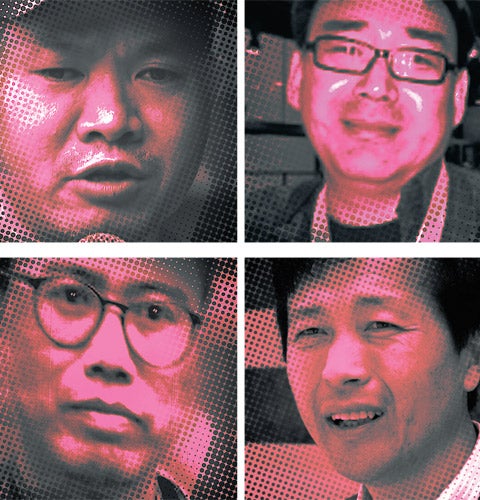China warns UN not to interfere as dissidents are rounded up

China told the United Nations to stay out of its affairs yesterday amid criticism of one of the biggest roundups of dissidents for years, prompted by fears that protests sweeping the Arab world could inspire a similar uprising against the authoritarian regime.
Australia called for authorities to reveal the whereabouts of a political blogger who has not been seen since the weekend, the latest suspected detainee from a big crackdown on political expression that is unprecedented in modern times.
The Sydney-based spy novelist Yang Hengjun made a brief phone call to his sister to give a pre-arranged signal that he had been taken by secret police after complaining of being followed, according to a friend. Catherine Baber, Amnesty International's deputy director for the Asia-Pacific region, said: "Yang Hengjun's disappearance is extremely worrying, especially as it comes during one of the biggest round-ups of activists and critics for years.
"He joins a long list of peaceful reformists who have gone missing or been arrested in China in the last month."
The crackdown started after the revolts in the Middle East and North Africa, when anonymous online voices called for Chinese people to gather to emulate the "Jasmine Revolution" in support of democratic change.
The spotlight has been on China's human rights record since Liu Xiaobo was awarded the 2010 Nobel Peace Prize. Mr Liu is serving an 11-year sentence for subversion, and his wife, Liu Xia, is under house arrest in Beijing. The crackdown has led to a marked increase in control of the internet and public pronouncements that China's human rights are a domestic issue and outside bodies should not interfere.
The latest barb was aimed at the UN after one of its rights groups said the detention of a prominent human rights lawyer, Gao Zhisheng, missing for nearly a year, was in breach of international law. His wife, Geng He, has claimed that Mr Gao – who defended religious dissenters including members of the outlawed Falun Gong spiritual movement – had been tortured many times.
The lawyer's wife called on President Barack Obama to ask President Hu Jintao to let Mr Gao make contact. "And if he has been killed, we should be allowed the dignity of laying him to rest," she wrote in a public letter.
The Chinese government responded by saying it did not know where Mr Gao was and to stay out of China's business. "China attaches importance to co-operation with the UN human rights mechanisms," said Jiang Yu, the foreign ministry spokeswoman. "We also urge these mechanisms to maintain an objective and impartial attitude and to respect China's judicial sovereignty. I would like to add that China is a country ruled by law, with an independent judiciary that handles cases."
The wave of detentions and heightened internet censorship has highlighted the nervousness in Beijing about any signs of opposition to its one-party rule. In Sichuan province, the pro-democracy writer and editor Ran Yunfei was charged with subversion for his alleged role in calling for popular uprisings in China similar to those in the Middle East and North Africa.
Sharon Hom, executive director of the rights group Human Rights in China, called on the world to put pressure on the Chinese government to guarantee rights.
"In continuing to criminalise individuals who speak out about the root causes of the problems affecting the society, the Chinese authorities are engaging in a doomed-to-failed effort to silence their critics," she said. "All they are demonstrating are their lack of solutions, their insecurity, and their lack of control."
China's dissidents...
Ran Yunfei
The blogger was arrested on suspicion of "inciting subversion of state power" five weeks ago. Mr Ran, 46, was one of the first signatories of the Charter 08 document calling for democratic change. Mr Ran was known for his criticism of government policy and for calls for tolerance for dissenting views. As domestic websites in China refused to carry his writings, he moved his blogs and other social networking outside China.
Liu Xianbin
This prominent activist was sentenced to 10 years in jail after he published pro-democracy articles online. His trial lasted a few hours, and it is the third time that Mr Liu has been imprisoned for his activism – he was also jailed for taking part in the pro-democracy protests in 1989, and subsequently jailed for his role in the Democracy Party. Navi Pillay, the UN High Commissioner for Human Rights, has expressed concern about his case.
Yang Hengjun
Australian diplomats are trying to get information from the Chinese government about Yang Hengjun, a Chinese-born Australian spy novelist who disappeared in the country. His novel Fatal Weakness, the first part of a trilogy, is not allowed to be published in China because of its content, which looks at corruption. Mr Yang telephoned a friend on Sunday from Guangzhou airport to say three men were following him.
Tang Jitian
Friends say that the lawyer was taken away after police broke into his home on 16 February and has not been heard from since. He had been involved in efforts by rights lawyers to help the blind lawyer Chen Guangcheng, who was released from prison last year but remains under house arrest. Mr Tang is one of several rights lawyers who have had their licence to practice revoked during the crackdown against activists.
Join our commenting forum
Join thought-provoking conversations, follow other Independent readers and see their replies
Comments
Bookmark popover
Removed from bookmarks